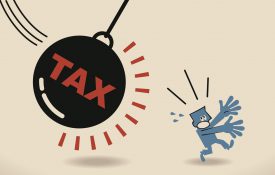-
Did You Hear That? Specific Brain Activity Linked With Imagined Hearing
Being able to distinguish what is real and what is not may seem pretty basic, but the inability to perform this task could be a marker of many psychiatric disorders. This task, known to researchers as “reality monitoring,” is at the core of a study from scientists at Yale University.
-

The Taxman Cometh: Science Explains Why Some Pay and Others Evade
Despite the threat of penalties, some people decide that the government won’t be getting their tax money. Psychological science shows what motivates some to pay and others not.
-
Researchers Make Strides in Early Diagnosis for Autism
It’s World Autism Awareness Day, an annual celebration in which autism organizations across the globe engage in fundraising and educational events to raise public understanding of the developmental disorder. And it falls in the wake of last week’s U.S. government report showing a 30 percent rise in autism rates. According to the Centers for Disease Control and Prevention, the condition now affects an estimated one of every 68 8-year-old children, up from one in 88 just two years ago. Fortunately, psychological scientists are helping researchers from other disciplines make progress in early diagnosis and intervention for children with autism.
-
Patching the Leaky Pipeline of Women in STEM
March is designated Women’s History Month in the United States, recognizing “generations of women whose commitment to nature and the planet have proved invaluable to society.” And yet, as we celebrate the many advances and achievements of women across history, a stark fact remains: Women continue to be underrepresented in science, technology, engineering, and math (STEM) careers. It’s a complex issue, driven by many factors. Some point to existing biases and stereotypes related to women and their abilities, while others talk about gender differences in achievement motivation and self-image. Many emphasize the lack of visible women leaders and role models in STEM fields.
-
Kids Come to Like Their Own Before They Dislike “Outsiders”
Social groups form along all sorts of lines -- from nationality to age to shared interests, and everything in between. We come to identify with our groups, whichever those might be, to the point where we prefer people who belong to our groups and discriminate against those who don't. These group affiliations undoubtedly confer tangible and intangible benefits, but those benefits often come at a cost to members of other so-called out-groups. Given the consequences for human societies, researchers David Buttelman and Robert Bohm of the University of Erfurt in Germany set out to investigate the early origins of intergroup discrimination.
-
Busted Bracket? Science Suggests Strategy to Improve March Madness Picks
It’s official: No one on this planet will walk away with Warren Buffett’s $1 billion dollar prize for filling out a perfect March Madness bracket. Hopes for the money were quickly dashed after the second round of games in the NCAA college basketball tournament – Dayton topped Syracuse, Stanford snuffed out Kansas, and Kentucky ended Wichita State’s hopes for the first perfect NCAA season in almost 40 years. Suffice it to say, we all made wrong picks in one way or another. It’s likely that some people will blame their mistakes on the bracket “gurus” – those experts who allegedly know the ins and outs of each game in extraordinary detail.

